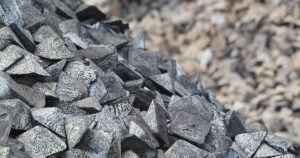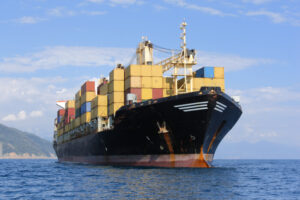
Ukraine exported 691.8 thsd tonnes of sugar in 2023/2024 marketing year (MY, July 2023 – June 2024), of which 77% was shipped to the European Union, the press service of the National Association of Sugar Producers of Ukraine “Ukrtsukor” reports.
According to the report, the main importing countries of Ukrainian sugar to the EU were Italy, whose share in the supply of Ukrainian sugar to the EU was 19%, Bulgaria (18%) and Hungary (14%).
In addition, the top three buyers of Ukrainian sugar outside the EU were Cameroon, which accounted for 17% of supplies, Libya (15%) and Turkey (11%).

Ukrainian mining companies have increased exports of iron ore in physical terms by 2.1 times year-on-year to 23 million 318.681 thousand tons this year.
According to the statistics released by the State Customs Service on Friday, foreign exchange earnings from iron ore exports increased by 72.1% to $2 billion 32.671 million in the period under review.
Iron ore was exported mainly to China (36.39% of supplies in monetary terms), Slovakia (17.04%) and Poland (16.94%).
In January-August 2024, Ukraine imported iron ore worth $223 thousand in the total volume of 794 tons, while in January-August 2023 it imported iron ore worth $81 thousand in the total volume of 118 tons. Imports this year were carried out from the Netherlands (31.70%), Poland (28.57%) and Norway (18.75%).
As reported, in 2023, Ukraine decreased exports of iron ore in physical terms by 26% compared to 2022 – to 17 million 753.165 thousand tons, foreign exchange earnings from iron ore exports amounted to $1 billion 766.906 million (down 39.3%). Iron ore was exported mainly to Slovakia (28.39% of supplies in monetary terms), the Czech Republic (19.74%) and Poland (19.56%).
Last year, Ukraine imported iron ore worth $135 thousand in the total amount of 250 tons. During this period, imports were made from Norway (34.81%), Italy (28.89%) and the Netherlands (28.89%). While in 2022, iron ore was imported for $65 thousand in a total volume of 101 tons.

In January-August this year, Ukraine reduced pig iron exports in physical terms by 19.8% compared to the same period last year, to 749.454 thousand tons. According to statistics released by the State Customs Service (SCS) on Friday, pig iron exports in monetary terms decreased by 19.6% to $286.447 million during the period.
At the same time, exports were carried out mainly to the United States (66.28% of supplies in monetary terms), Italy (10.03%) and Turkey (9.85%).
In the first eight months of the year, the country imported 15 tons of pig iron worth $37 thousand from Germany (in January, March, May, June, July and August, there were no imports), while in the same period in 2023, it imported 65 tons of pig iron worth $97 thousand.
As reported, in 2023, Ukraine reduced pig iron exports in physical terms by 5.8% compared to 2022 – to 1 million 248.512 thousand tons, while exports in monetary terms decreased by 26.2% to $471.467 million. Deliveries were made mainly to Poland (51.91% of supplies in monetary terms), Spain (21.41%) and the United States (13.15%).
In 2023, Ukraine imported 154 tons of pig iron worth $156 thousand from Germany (42.31%), Brazil (41.67%) and Poland (16.03%), compared to 40 tons of pig iron worth $23 thousand in 2022.

During the 13 months of the Ukrainian Sea Corridor’s operation, 68.6 million tons of cargo were transported. Of these, 46 million tons were grain.
During this period, more than 2.5 thousand vessels used the “sea corridor” to export products to 46 countries, the press service of the Ministry of Communities and Territories Development reported on Facebook.
The report quotes Oleksiy Kuleba, Deputy Prime Minister for the Restoration of Ukraine and Minister of Community and Territorial Development, as saying that despite the Russian missile attack on a civilian ship transporting grain from Ukraine to Egypt, Ukraine will continue to ensure the effective operation of the Ukrainian corridor in the Black Sea.
“Ukraine will continue to ensure the effective operation of the Ukrainian corridor in the Black Sea so that all countries in Africa and the Middle East receive the necessary products. The world should respond accordingly and increase sanctions pressure on Russia for violating the international law of the sea,” Kuleba said.
He reminded that Russia systematically attacks port infrastructure, which directly affects food security in the world. During the full-scale invasion, more than 50 such attacks took place, as a result of which more than 280 port infrastructure facilities were damaged and more than 100 thousand tons of agricultural products were destroyed.
Earlier it was reported that on September 12, Russia launched a missile attack on a civilian ship transporting grain from Ukraine to Egypt. Ukraine reported this crime to the United Nations and the International Maritime Organization. The ship that was hit by the Russian Federation in the Black Sea was flying the flag of Saint Kitts and Nevis.

In August this year, the cargo turnover of Ukrainian ports amounted to 7 million tons, which is more than twice as much as in 2023, when it was recorded at 3.3 million tons, the Ukrainian Sea Ports Authority (USPA) reported on its Facebook page.
“The leaders of cargo turnover are grain and ore cargo – 4 million tons (against 2.3 million tons in 2023) and 1.2 million tons (against 195 thousand tons in 2023), respectively,” the agency said.
At the same time, the cargo turnover through the Ukrainian sea corridor in August amounted to 5.9 mln tons, of which 3.6 mln tons were the products of Ukrainian farmers.
In total, in January-August 2024, Ukrainian ports handled almost 67 million tons of cargo, compared to 37.7 million tons in the same period a year earlier. The USPA summarized that 7769 vessels were handled compared to 9732 last year.

Despite Russia’s war against it, Ukraine intends to export 60-65% of its harvest in the 2024-2025 marketing year (MY), Minister of Agrarian Policy and Food Vitaliy Koval said during a national telethon.
“The main issue facing the government is to ensure the country’s food security. At the same time, we plan that Ukraine will export about 43 million tons (of agricultural products – IF-U) to foreign markets,” he said.
Koval specified that wheat exports are expected to reach 16.2 million tons, and corn – about 25 million tons. Ukrainian processors will be provided with wheat, and the surplus is already being exported.
“Today, the agricultural sector accounts for about 60% of the country’s total export revenue. It is very important that foreign markets receive Ukrainian products. And not only agricultural raw materials, but also value-added products and processed products. It is very important that these percentages grow. It is also important that the amount of harvested crops that we can export does not remain in the country and that exports grow,” the Minister of Agrarian Policy summarized.